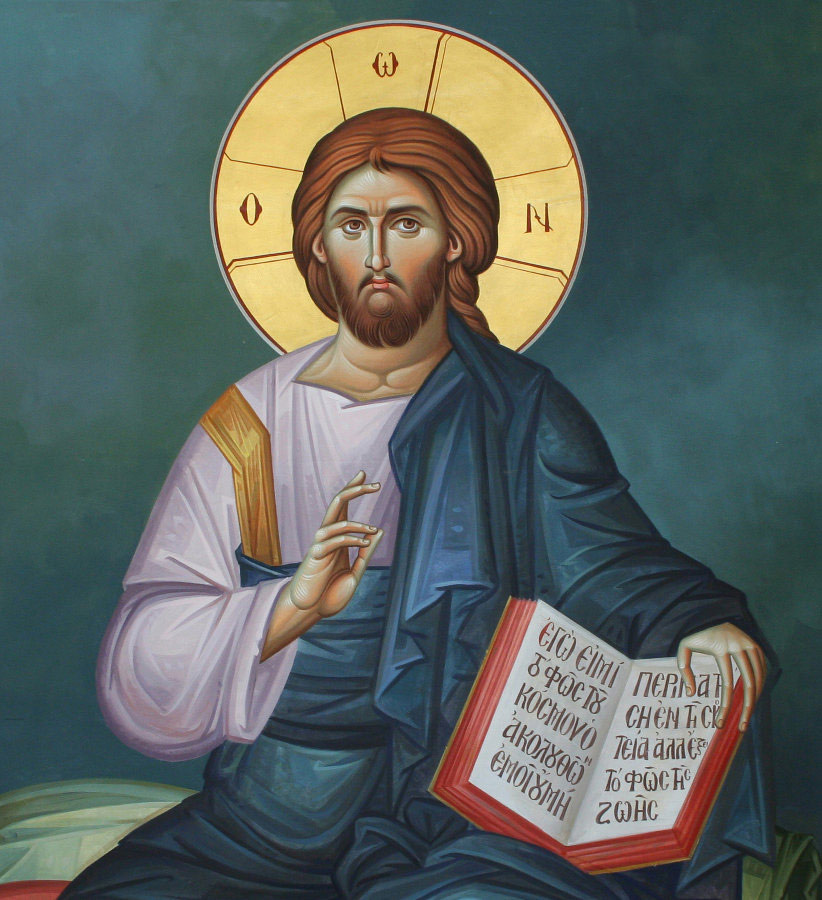
After the Epistle and Gospel is read, and the Sermon is concluded, the Church is compelled to pray for all those devout Orthodox Christians who wholeheartedly accept the word of God. Those who keep the commandments of the Gospel and strive to follow the footsteps of Christ in their daily lives. As the Deacon exhorts the faithful to pray, they respond with the usual "Lord have mercy". The Priest, praying in a low voice in front of the Holy Table, asks God to accept him with a clean conscience to offer the Sacred Mysteries. The Priest is also bound to pray for his fellow believers to partake of the Holy Mysteries without guilt and condemnation, and for them to inherit the Kingdom of Heaven.
We are amazed by the fact that the first prayer the Deacon says is: "Let us all say with all our soul and with all our mind, let us all say". The Church calls us once again to be attentive, and to turn to the Lord with our entire souls and spiritual strength, in order to not only ask Him to fulfill our needs, but also the needs of our brothers and sisters. This so that He may give us His rich mercy. For all this we pray with warmth and faith, and not in a superficial or merely formal way (as it can be when we are careless). There were times in the life of the Lord that when someone asked Him for His help, the Lord did not immediately grant their request. He first sought to rekindle their faith, as in the case of the unhappy father, whose son was possessed by a demonic spirit (See Mark 9: 14-27). Initially, the father turned to the Lord’s Disciples to heal the child, for the Lord was on Mount Tabor at that time. The Disciples count not do it, evidently also due to the weak faith of the father. The father of course wanted his child to be cured, and begged the Disciples to do so, but in the end he did not believe that it could be done. When the Lord returned, the father turned to Jesus Himself. From the words that he addresses to the Lord, the state of the father’s faith is revealed: "If You can do anything, have compassion on us and help us." The answer to the problem is revealed in Jesus' words to the father: “If you can believe, all things are possible to him who believes.” (Mark 9:22-23). With the confession of the father: "Lord, I believe; help my unbelief!" (9:24) a miracle took place and the child was healed from the influence of the demon.
So when we ask for something in our prayers and do not receive it, let us not get the false impression that "God does not hear us" (as some say), but let us honestly examine our own conscience. Do we believe that God has the power to fulfill our request? After all, the Brother of the Lord James said, "You ask and do not receive, because you ask amiss" (James 4:3). It is for these reasons that the Church urges the congregation before all other prayers: "Let us all say with all our soul and with all our mind, let us all say".
The Deacon, with the faithful, ask for their prayers to be accepted and that the merciful God may have mercy on us. We know that we are guilty before Him and have no claim, but we receive strength from the love and great mercy that came from the Sacrifice on the Cross, and so we dare to ask for His grace.
After the general exhortation, the Deacon continues to pray:
For the Archbishop of the ecclesiastical area; the priests; the Deacons and for all those who offer their ministry in the holy churches.
For the health, forgiveness, peace and salvation of those who live in the Parish or in the Monastery and the whole ecclesiastical area.
Those who build temples and monasteries and take care of their maintenance are specially mentioned; we also owe it to the Psalters, the nuns and all those who take care of the smooth functioning of the Parish, and all those who in any way contribute to the Churches’ common good.
For these reasons, we have a duty to pray for all of the above, since they are mainly in charge of the proper functioning of our churches.
In this extensive series of prayers, a prayer is said for the founders of the church, and all who have reposed in the Lord. St. John Chrysostom says that "the Holy Apostles did not set the prayers in favor of the reposed believers during the Divine Liturgy without a serious reason. They knew that the souls of the deceased gained much spiritual benefit from the prayers of the living members of the Church. They are a people and their priests with their hands raised in a position of prayer during the Divine Liturgy, they pray for souls and how could it then be, that the merciful God would not have mercy on them! It is a common belief of the Orthodox Church that the greatest relief is provided to the reposed through the prayers said for them during the Divine Eucharist". That is why we perform the well-known Memorial Services in combination with the Divine Liturgy. Let us add here that the prayers of the living faithful for the dead show that there is an inseparable and lasting close bond between the earthly Church Militant and the Church Triumphant in Heaven. As the Apostle Paul writes succinctly: "For if we live, we live to the Lord; and if we die, we die to the Lord. Therefore, whether we live or die, we are the Lord’s." (Romans 14:8). Amen.





